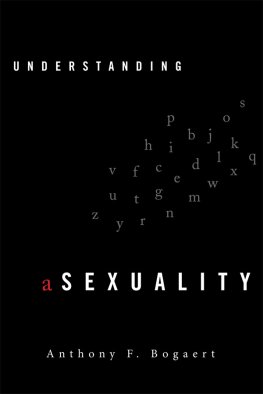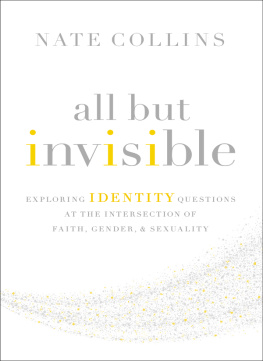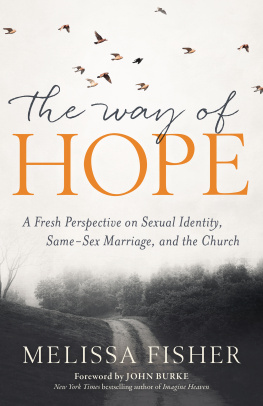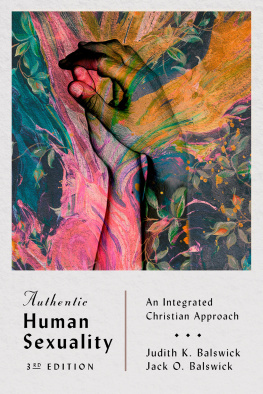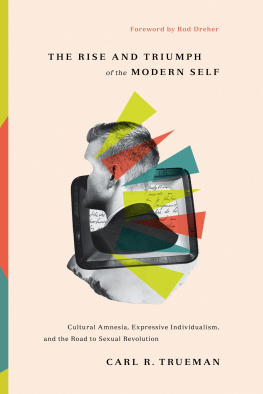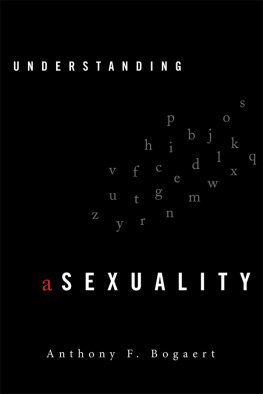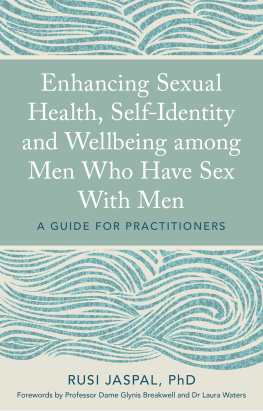Acknowledgments
I am indebted to a great number of people whose friendship, support and critique were vital for the completion of this book. After delivering a series of talks on sexuality at George Fox University, H. David Brandt, the president at the time, encouraged me to write this book, one of several projects that has benefited from his enthusiasm. At Bethel University, where my writing began, Im grateful for support from students and colleagues including Jay Barnes, Curtiss DeYoung, Jim Hurd, Lindsay Johnson, Bamidele Andrew Odubote, Harley Schreck and Samuel Zalanga. Minnesota friends who never tired of talking about sexuality with me included Rachel Anderson, Victor Barge, Carla Barnhill, Jimmy Barnhill, Kathryn Green, Katie Hutton, Shelley Pagitt, Naomi Schwenke and Colleen Welch.
I finished the book at Messiah College, where Im thankful for support from colleagues, including Gene Chase, Michael Cosby, Kris Hansen-Kieffer, Dean Susan Hasseler, Meg Hoover, Douglas (Jake) Jacobsen, Rhonda Jacobsen, Faith Minnich, President Kim Phipps, Susie Stanley, Brian Smith and Amy VanDerWerf. Messiah College librarians Beth Transue and Liz Kielley always helped me find what I needed, and Beth offered valuable manuscript critique as well. The Pinklings, my writers group, struck the right balance between incisive critique, lavish encouragement and good dessert. Pinklings include Sharon Baker, Lynne Cosby, Crystal Downing, Meg Ramey, Valerie Smith, Valerie Weaver-Zercher and Cynthia Wells. Students who read, critiqued and/or edited the manuscript include Karli Davis, Caitlin Kruse, Chelsea McIntyre, Kate Miller, Samantha Moore, Ben Olsen, John Sommerville, and students in the fall 2008 Sexuality in Cross-Cultural Perspective class and the spring 2010 Women and Men in American Society class.
Blog readers provided essential critique via email and comments; thanks especially to Andrea Allen, Troy Blomquist, Randy Hughes, Christy Lambertson, Karen Maezen Miller, Heidi Renee, John Schaefer, Hugo Schwyzer and Ben Williams. I also relied on expert perspective from Mark Regnerus, Warren Throckmorton and Megan DeFranza.
Im very grateful to Al Hsu, my editor at IVP, for seeing through a rough draft to the book it could become.
I often wanted more time alone to write, but even more than that, I didnt want to miss or be missed by my family. Thanks to Oliver (four), Wesley (four) and Maxwell (three), for being so crazy and so adorable. Thanks to Ian, Simon and Gordon, my triplets who passed away at birth, for having come to me. And thanks to James, my husband, for believing in me and (most of) my ideas.
1

What Is Defined as Real
M y sons love to ask questions. When they were ages four, four and three, some of their favorite questions were about their bodies. One evening during bath time, I was tripped up by two good ones: Whats inside my fingernail? and Mommy, can you take off my foot so I can see the bones inside?
I stumbled in a different way over this one: Mommy, what are these?
Testicles, I said.
What are testicles?
They are part of what makes you a boy, I said. All boys have testicles. Immediately I felt disappointed with myself. All was a poor word choice. A boy who loses one or both testicles to accident or disease is still a boy. Some intersexual people are born with both testicles and ovaries. And in the Dominican Republic, due to a genetic issue, a number of children (called guevedoces, which means balls at twelve) were raised as girls, but then at puberty their testicles descended, and most (but not all) shifted to become boys.
One of my favorite quotes, taped to my office It may not be true that all boys have testicles, but if my sons take it as truth, there will be real consequences. Defining boyhood as strictly as I did would rule out the exceptional cases and might cause a son to question his own maleness should he lose one or both testicles.
Before I had a chance to launch into a college-level lecture from my perch on the bathroom sink, one boy announced, Then baby boys dont have testicles.
Another said, And neither do mommies or daddies or bears.
All caused another problem. In their minds, because all boys have testicles, baby boys, mommies, daddies and bears are in the category of those without testicles. At their developmental level, theyre learning to identify males and females. They need to understand that baby boys, boys, men and daddies are all male, just as baby girls, girls, women and mommies are all female, and that animals like bears come in male and female varieties. They also need to understand that every category has complications and exceptions, but that will be a conversation for later.
I stand by my claim that testicles are part of what makes a boy a boy, but I wish I had stopped there. By claiming that all boys have testicles, I made the category too rigid and didnt leave room for other ways of seeing boys, and for other kinds of boys. Depending on the context, boy could be defined genetically in terms of chromosomes (in a science class), biologically in terms of anatomy (at home in the tub) or even socially in terms of self-presentation (if a transgender girl passes as a boy, then socially she is a boy). Creating categories, even one as seemingly simple as boy, is not just descriptive. Categories also prescribe what is normal and right, and who belongs and who doesnt.
Like the categories of male and female or boy and girl, human sexuality is part of culture. Sex is a gift from God, but we dont receive it straight from heaven; it is always mediated by culture. We learn from others how to be sexy, how to find a sexual partner, and even which sexual behaviors are possible, desirable or typical. We cant even speak about sex without culture, as language provides shared symbols that enable communication. Consider common English phrases for sexual intercourse. Having sex emphasizes sex as a thing that is possessed by individuals. Doing it portrays sex as an action performed by individuals, with it inferring that sex is something mundane or ordinary. Making love highlights intimacy and romance, and also seems to correspond with an industrial economy in which producing goods and services is valued. Taken together, contemporary ways of speaking about sex encourage people to think of sex as something an individual can have, get, make or do. More graphic euphemisms portray sex as dirty, naughty or meaningless. Language reflects the cultural meanings ascribed to sex, which shape how people express sexuality. Its true: what is defined as real is real in its effects.
There are many cultural dimensions of human sexuality, and sexual identity is an important one. Sexual identity is a cultural pattern by which people understand their sexuality. Its a concept that was created by people in an attempt to conceptualize human sexuality more clearly, and it has become a shared understanding that is passed on to others. In his letter to the Romans, Pauls immediate focus was on broader issues of life in the church in Rome, but studying the sexual patterns of the world is a fitting response to his appeal in Romans 12 to cultivate reasonable or rational worship.
The Familiar Strange and the Strange Familiar
Sex seems so biological and so natural that you might assume sex works pretty much the same way for all people. But the anthropological perspective reveals that what seems natural may or may not be from nature. It may seem perfectly normal to eat cereal for breakfast or to sleep indoors, for example, but a crosscultural perspective would reveal that those habits are not a natural part of being human. Other people have practices that seem just as normal to them. So while it may seem perfectly natural to date before marriage, or to have sex in a bed, or to kiss in public (or to never kiss in public), none of these practices are cultural universals.


